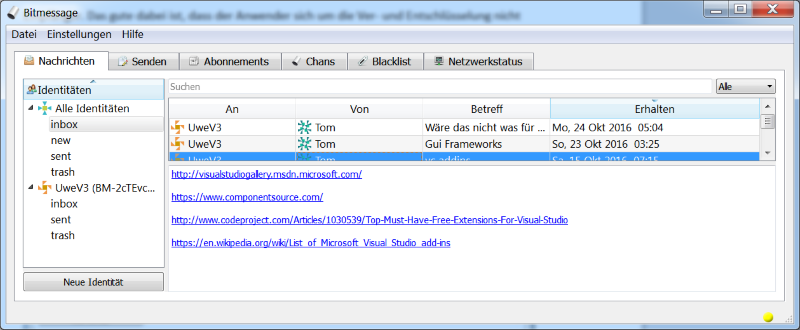


This is for further extensions of the protocol with other messages. If a node receives an unknown message it must silently ignore it. If the error is not related to an object, this string is empty.Ī human readable string in English, which describes the error. If the error is related to an object, this Variable length string contains the inventory vector of that object. For non fatal errors this field has no meaning and should be zero. You inform the other node, that you will not accept further connections for this number of seconds. If the error is fatal, you can specify the ban time in seconds, here. The node will drop the line for that error and maybe ban you for some time. If set to 1, than it's an error, so you may expect, something was going wrong (e.g. You can expect, everything still worked fine. The message is intended to inform the other node about protocol errors and can be used for debugging and improving code. This message may be silently ignored (and therefor handled like any other "unknown" message). Version 3 of the protocol defined a special error (or debug) message. The getdata message is identical to version 2 getdata message. The inv message is identical to version 2 inv message. The addr message is identical to version 2 addr message. The verack message is identical to version 2 verack message. The version message is identical to version 2 version message. They are summarized into one single message. Only the four "objecttype" messages are not valid any more. Most message types are unchanged from version 2 to version 3. Here is an example address which uses malformed varints: BM-CVA3RC7Mvy7JDNSpQChktwrSe4KNMaEdDdcymfUo. The 9-byte form is no longer useful and SHOULD NOT be used. In version 3 only the shortest representation, 0x0A, is allowed. The shortest possible encoding MUST be used. The protocol is tolerant for further object extension.The protocol is tolerant for further message extension.The POW is more difficult but can be easier if you lower the time to live.objects may have a variable time to live.object type is now coded inside the message.

Here are the new features of the version 3 of Bitmessage protocol in keywords: So you should use the current protocol specification, which includes the version 3 changes, as a reference for all formats which are not mentioned in this description. Things which are unchanged from version 2 are not described in detail. It describes the changes in protocol version 3 versus version 2. This is a DRAFT for the protocol version 3. Protocol specification v3 - Bitmessage Wiki
Stre.amchan bitmessage install#
The next two commands install RingingLiberty YUM repository, a version of the OpenSSL crypto libraries with ECC enabled (to an alternate location) and some additional, required supporting applicatoins.Ġ.4.4 was recently released and is a mandatory update (by 11-16-2014) as the protocol has moved to v3:Īll objects sent on the network should support protocol v3 starting on Sun, 22:00:00 GMT.

As such, run them one at a time.Īs mentioned earlier, the OpenSSL that is installed by default (and maintained by RedHat/the Fedora Project) prevents bitmessage from running. After each command you will be prompted for the root user password.
Stre.amchan bitmessage password#
You need to know the root user password in order to install RPM packages. So, enough with the background and on to the walk-through. This capability, unfortunately, is required for bitmessage to function. Specifically, they are refusing to do any work to re-enable ECC or Elliptic Curve Cryptography (not going to go into it now). In RedHat's defense, they have re-enabled the minimal necessary functionality to the OpenSSL crypto libraries in order to get the Bitcoin wallet running but that's it. I say perceived because RedHat had a knee jerk reaction over something someone said (no legal threat has EVER been made to the best of my knowledge) and rather than do the due diligence and research the issue and then correct the problem, they have chosen to ignore it. The biggest issue with Fedora (18 and after) is that RedHat has hobbled the OpenSSL package due to a perceived patent issue. This thread will be for walk-throughs of the instructions that can be found at Compiling instructions - Bitmessage Wiki I'm shamelessly copying their work here as a basis for these How-Tos.įedora 20 is proving to be an interesting animal as this is the second How-To I've written that is basically just for this distribution. Updated instructions in Post #3: Bitmessage Installation Instructions Fedora 20


 0 kommentar(er)
0 kommentar(er)
